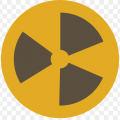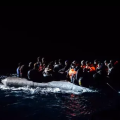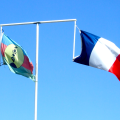Pour les Mélanésiens qui l’habitent depuis des millénaires, c’est le Kanaky.
Pour les français de métropole, c’est un territoire d’outre-mer, avec son statut particulier qui lui accorde beaucoup d’autonomie. Mais c’est aussi, et en particulier pour les dirigeants français, un des signes de la grande puissance française dans le monde.
Pour des raisons aujourd’hui essentiellement géopolitiques (garder la Chine à distance et posséder des eaux territoriales immenses), les autorités semblent vouloir en faire un territoire définitivement partie intégrante de la France. Les Mélanésiens s’opposent à cette vision qui les éloigne de leur souveraineté.
Le projet de réforme électorale a rallumé les braises d’un conflit refoulé. Et le transfert et l’incarcération en métropole de leaders indépendantistes plus radicaux ne peuvent manquer de rappeler ceux du général haïtien Toussaint Louverture emprisonné au fort de Vaux ou en sens inverse ceux de militants kabyles réclamant l’indépendance et envoyés en Nouvelle Calédonie.
On peut craindre d’y voir le signe d’une résurgence coloniale. L’avenir du Kanaky peut encore être pensé de manière harmonieuse entre les leaders mélanésiens traditionnels et la puissance coloniale pour un pays souverain associé à la France.
Encore faut-il commencer à écrire cette nouvelle page.
Télécharger la Lettre n°304 septembre 2024 (PDF)
Informations recueillies par le Département de Sciences Politiques de l’Université catholique ukrainienne
Schools and kindergartens in Ukraine affected by war
According to the Ministry of Education and Science of Ukraine, there are 14 873 schools in Ukraine with 4,2 million children and 441 thousand teachers (https://mon.gov.ua/ua/tag/zagalna-serednya-osvita). On February 25, the next day after Russia attacked Ukraine, the Ministry recommended that all educational institutions in the country, including schools and universities, go on a two-week vacation, leaving children without access to education (https://portal.lviv.ua/news/2022/02/25/v-ukraini-pryzupyniaiut-navchannia).
Instead, schools have become centers for collecting humanitarian aid and volunteering to help the Ukrainian army and territorial defense. The Ministry has launched a flash mob “Educators help”, intended to mobilize the schools’ staff to help the Ukrainian Armed Forces and civilians (https://osvita.ua/news/85871/).
So far, the resumption of the education is a private enterprise. The NGO “Smart Education” organizes online-meetings for children of different ages on Zoom. According to its representatives, these meetings will not be formal lessons, but “rather, interesting stories and facts to keep children in touch with their peers and adults and switch their attention from disturbing news and scary reality.” (https://osvita.ua/school/85865/).
Foreign countries have already begun to organize education for displaced Ukrainian children. Tallinn City Government will open a temporary school for children who have fled from the war to Estonia. The facility will be open until the end of the school year and then children will be able to enter the Estonian education system (https://news.err.ee/1608518771/tallinn-to-open-temporary-ukrainian-school-for-displaced-children).
The UN Child Rights Committee said in its statement, issued on 4 March 2022, that “children in Ukraine are currently subject to extreme suffering and trauma. They are being killed and injured. They are separated from their families. Homes are being destroyed. Their education is interrupted. There are reports of schools, orphanages and hospitals being attacked. Their daily lives and routines have been utterly shattered. As a consequence of the military attack on Ukraine, children are exposed to extreme violence and experience unbearable levels of fear and anxiety.” (https://reliefweb.int/report/ukraine/ukraine-un-committee-urges-end-killings-children). According to the Office of High Commissioner for Human Rights, between 4am on 24 February and midnight on 3 March, the deaths of at least 19 children and injuries of 31 children were recorded.
Attacks against schools and hospitals are classified by the United Nations as one of the six grave violations committed against children. According to the UN, at least six educational facilities have faced shelling in recent days. Two teachers were killed last Friday when a missile struck a school in Gorlovka in eastern Ukraine (https://www.humanitarianresponse.info/sites/www.humanitarianresponse.info/files/documents/files/attacks_on_schools_in_ukraine_endangering_childrens_lives_and_futures_-_press_release.pdf).
On 4 March, 2022, a school in Zhytomyr, northern Ukraine, was hit by a Russian missile, receiving a significant damage. At least three schools in Ukraine’s second-largest city, Kharkiv, were hit by Russian military strikes on Tuesday, March 1 (https://edition.cnn.com/europe/live-news/ukraine-russia-putin-news-03-04-22/h_719d5252705c8e378e4ff3bfa74b72a5).
There are approximately 15 000 kindergartens of all forms of ownership in Ukraine, designed for 1 125 000 children (https://konkurent.ua/publication/14694/v-ukrayini-kilkist-doshkilnih-zakladiv-vpala-do-rivnya-2010-roku-infografika/). According to the recommendations of the Ministry of Education and Science of Ukraine, due to the introduction of martial law, preschool education institutions have suspended the educational process (https://portal.lviv.ua/news/2022/02/27/cherez-vijnu-shkoly-lvova-pishly-na-kanikuly-a-sadochky-zakryly).
The Russian army indiscriminately shell kindergartens in Ukraine. On the morning of 25 February, its 220mm Uragan rocket dropped widely-banned cluster munitions on the Sonechko (Happy Sun) nursery, orphanage and kindergarten in the town of Okhtyrka in Sumy Oblast where civilians took shelter, killing 5 people, including a child, and wounding another child. The strike may constitute a war crime https://www.amnesty.org/en/latest/news/2022/02/ukraine-cluster-munitions-kill-child-and-two-other-civilians-taking-shelter-at-a-preschool/.
A week before the start of a large-scale invasion into Ukraine, on February 17, the Russian-backed separatist shelled a kindergarten in Stanytsya-Luganska, Lugansk Oblast (https://www.bbc.com/ukrainian/news-60412876).
з повагою,
Юрій Підлісний, PhD
Завідувач кафедри політичних наук,
Керівник Програми « Етика-Політика-Економіка »,
Українського Католицького Університету
Голова Комісії УГКЦ у справах Родини та Мирян
www.epe.ucu.edu.ua
www.ucu.edu.ua
Yuriy Pidlisnyy, PhD
Chair of the Political Science Department
Director of the BA Program « Ethics-Politics-Economics »
Ukrainian Catholic University
Head of the UGCC Commission for Family and Laity
www.epe.ucu.edu.ua
www.ucu.edu.ua
24 février 2022
Soutien et prière pour l’Ukraine
Déclaration de Mgr Éric de Moulins-Beaufort, archevêque de Reims et président de la Conférence des évêques de France, au sujet du conflit militaire en Ukraine.
La décision du Président de la Fédération de Russie d’intervenir militairement en Ukraine enclenche un processus de guerre qui suscite en nous une immense inquiétude. La Fédération de Russie, quoi qu’il en soit de ses raisons, brise unilatéralement un processus de paix engagé depuis des années et viole le droit international ; les Ukrainiens défendent leur pays, avec ce qu’il représente d’histoire et culture, de marche dans la dignité vers la liberté. Les Européens savent que la guerre n’est jamais une solution. Ils savent aussi qu’il ne peut y avoir de paix sans justice ; de nos jours, la justice passe par le respect du droit international.
A la suite du pape François et en union avec les évêques de France, j’appelle les catholiques de France à prier pour les Ukrainiens et pour le retour de la paix en Ukraine, pour toutes les victimes de la violence aveugle que porte la guerre. Prions aussi pour le peuple russe tout entier, dans sa diversité. Dans notre prière, n’oublions pas les soldats, les familles qui seront endeuillées, les personnes qui seront blessées. N’oublions pas non plus les populations civiles et, parmi elles, les plus fragiles et les pauvres qui sont trop souvent les premières victimes des conflits. La responsabilité des dirigeants qui décident la guerre est immense à leur égard.
Les catholiques prieront en particulier comme l’a suggéré le Pape lors du mercredi des cendres, le 2 mars 2022. Ce jour-là, les chrétiens entrent en carême et sont invités à prier davantage et à jeûner. Nous offrirons cela pour la paix et la justice, en communion avec tous ceux qui en Ukraine et en Russie aspirent à la paix, à la vérité et à la justice.
Que le Seigneur éclaire les gouvernants, convertisse les cœurs qui doivent l’être et soutienne tous ceux qui se mobiliseront pour restaurer la paix, le dialogue et la concorde entre les peuples. Qu’il inspire aux évêques des différentes confessions les paroles et les gestes qui réconforteront et qui serviront le véritable esprit de paix.
I am deeply worried by the latest reports of escalating military actions of the Russian Federation in Ukraine, opening up the alarming scenario of an armed conflict causing horrific human suffering, death and destruction. Today, peace on the whole European continent and beyond is facing a serious threat.
On behalf of the Bishops of COMECE, I wish to reiterate our fraternal closeness and solidarity with the people and institutions of Ukraine.
Sharing Pope Francis’ feelings of anguish and concern, we appeal to Russian authorities to refrain from further hostile actions that would inflict even more suffering and disregard the principles of international law. War is a grave affront to human dignity and it has no place in our continent.
Therefore, we urgently ask the international community, including the European Union, not to cease seeking a peaceful solution to this crisis through diplomatic dialogue. We call on the European leaders gathering today for a special meeting of the European Council to show unity and endorse measures promoting de-escalation and confidence-building, while avoiding any steps that could potentially reinforce the violent conflict.
In the light of the emerging humanitarian situation provoked by the on-going hostilities, we appeal to European societies and governments to welcome refugees fleeing their homeland in Ukraine from war and violence and looking for international protection. It is our vocation, our responsibility and our duty to welcome and protect them as brothers and sisters.
Joining Pope Francis, we pray to Our Lady, the Queen of Peace, that the Lord may enlighten those bearing political responsibility to “examine their consciences seriously before God, who is the God of peace and not of war; who is the Father of all, not just of some, who wants us to be brothers and not enemies”.
Cardinal Jean-Claude Hollerich SJ., COMECE President

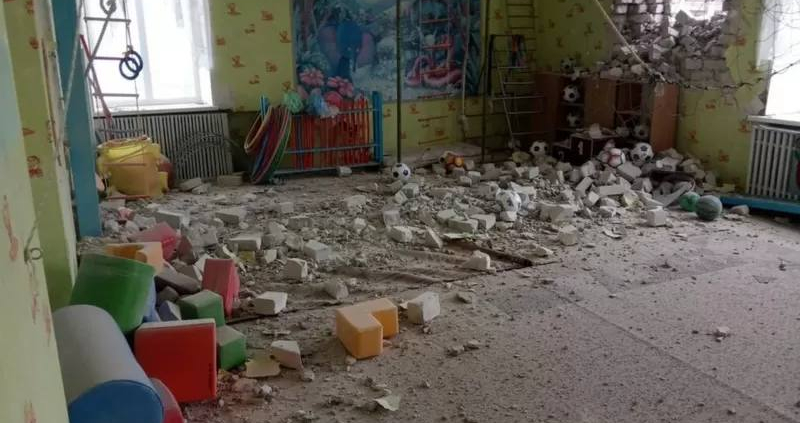
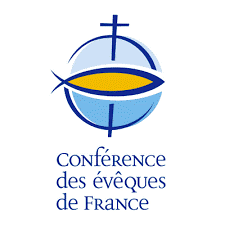 CEF
CEF
